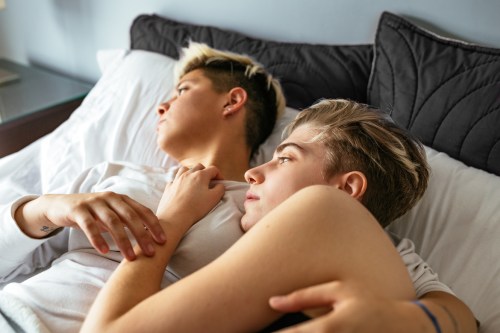Being on the asexuality spectrum and having a lower libido are often incorrectly regarded as the same thing. But though the two independent experiences are indeed each characterized by lack of sexual desire and activity, they’re also not synonymous. This distinction matters because for someone experiencing a lack of sexual desire and activity, the conflation of these two disparate experiences can lead to confusion about one’s sexual identity. So, by being able to distinguish being asexual (or being on the asexuality spectrum) from having a low libido, a person stands to better understand themselves and their own sexual identity. Understanding one’s own sexual identity, in turn, can make understanding the self more holistically possible.
Experts in This Article
queer sex educator
co-host of Sounds Fake But Okay
licensed marriage and family therapist
To facilitate this increased understanding of your own relationship to sex, desire, and attraction, keep reading for expert definitions of both being asexual and having a low libido so you can parse what distinguishes the two.
Asexuality, defined
The term “asexual,”—similar to other identity signifiers, like transgender or queer—can function as both a specific sexual orientation label or as an umbrella term that encompasses multiple (more-specific) identities. The way being on the asexuality spectrum presents can vary depending on who’s claiming it (which is also the case with other identity terms). Commonly, however, when someone says they are asexual, what they mean is that they do not experience sexual attraction or desire towards anyone of any gender(s), or do not experience regular sexual attraction and/or desire, says Kayla Kaszyca, co-host of Sounds Fake But Okay, a podcast about asexuality and aromanticism. (ICYWW, the inverse of asexual is allosexual, which describes the capacity for sexual attraction and desire for others).
Asexuality can also describe inconsistent sexual attraction, or desire that only emerges under very specific circumstances. “There are a number of other sexual orientations that exist on the asexuality spectrum,” says psychotherapist and sex and relationship expert Rachel Wright, LMFT. These include demisexual, fraysexual, graysexual, and autosexual, to name just a few.
Someone who is demisexual, for example, only has the potential to experience sexual attraction after forming a deep emotional bond with them, says queer sex educator Cassandra Corrado. While an allosexual person might find a celebrity or stranger sexy, “a demisexual individual might be able to recognize them as looking nice, but couldn’t find them sexually attractive until or unless they form a bond with them,” she adds.
What a having a low libido means
Libido, sometimes known as your sex drive, is a vague measurement of a person’s interest in having sex. Unlike your heart rate or blood pressure, for example, there’s no quantitive measurement that points to libido, “so when we talk about libido being low or high, typically what we’re talking about is having a lower or higher interest in sex than your personal norm,” says Wright. Someone who typically seeks out sexual release seven times a week, for example, might notice that their libido is low during a week they only crave it twice. For someone else, though, who typically seeks sexual release a few times a month, a lower libido might be marked by not being in the mood at all during a specific month in question.
And to be sure, shifts in libido are common and can happen for any number of reasons, including stress levels, relationship issues, medications, diet, exercise, or sleep, says Wright. “A change in our libido functions as our bodies check-engine light,” she adds. “It’s an invitation for us to get curious about what’s going on with our emotional, mental, physical, and spiritual self.” And if the libido shift in question is a decline that was not necessarily welcome, it may be worth taking stock of what in your life changed leading up to this decline and consider making any life edits accordingly, should you so choose.
3 questions to differentiate between being asexual or having a low libido
1. Are you capable of being sexually attracted to others?
Asexuality refers to a person’s capacity for experiencing sexual attraction for others, while libido is a measurement of interest in having sex. Capacity for sexual attraction does not equate to interest in having sex.
So, someone on the asexuality spectrum doesn’t experience sexual attraction, but may still be interested in having sex for reasons unrelated to desire or attraction, according to Corrado. For instance, someone may want to have sex in order to conceive, reap the stress-busting benefits of orgasm, relieve menstrual cramps, or experience intimacy with their romantic partner. “Not experiencing sexual attraction doesn’t mean you have no sex drive or a low libido, so asexual people with high sex drives may have sex more often to fulfill that need,” adds Kaszyca. On the flip side, someone with low libido does experience sexual attraction for other people, and derives sexual pleasure from sex when they have it, but craves it infrequently (by their own standards).
2. Do you feel a lack of attraction only sometimes?
Asexuality is an identity label, while low libido is a temporary state of being. Sexual orientation can evolve and shift over the course of our lives, but generally speaking, there’s an assumed staying power to identify that the phrase “low libido” does not imply.
3. Is there an underlying cause?
Being asexual is a totally healthy, normal, and common experience of lack of sexual desire, which carries no underlying condition. In some cases, the same is true of lower libido, but sometimes it can be reflective of a larger medical issue, according to Wright, which is why she recommends anyone who has noticed a sex-drive drop-off to contact their health-care provider.
How to figure out whether or not you have low(er) libido or may be asexual
Put simply, if you want to want to have sex, you probably have a low libido. But if you feel indifferent about whether or not sex makes an appearance in your life, it’s more likely that you’re on the asexuality spectrum.
If the answer isn’t immediately apparent to you, Wright recommends journaling on the following questions:
- When was the last time I experienced sex attraction?
- Has the frequency of how often I crave sex changed?
- Have I ever experienced interest in having sex? When and under what contexts?
- What is my motivator for having solo sex?
- What is my motivator for having partnered or multi-partnered sex?
Based on those answers, consider where you feel you fall. Learning more about both asexuality and libido under the guidance of a sex therapist or sex-positive therapist can also be helpful for working through any suggested next steps.
Sign Up for Our Daily Newsletter
Get all the latest in wellness, trends, food, fitness, beauty, and more delivered right to your inbox.
Got it, you've been added to our email list.











